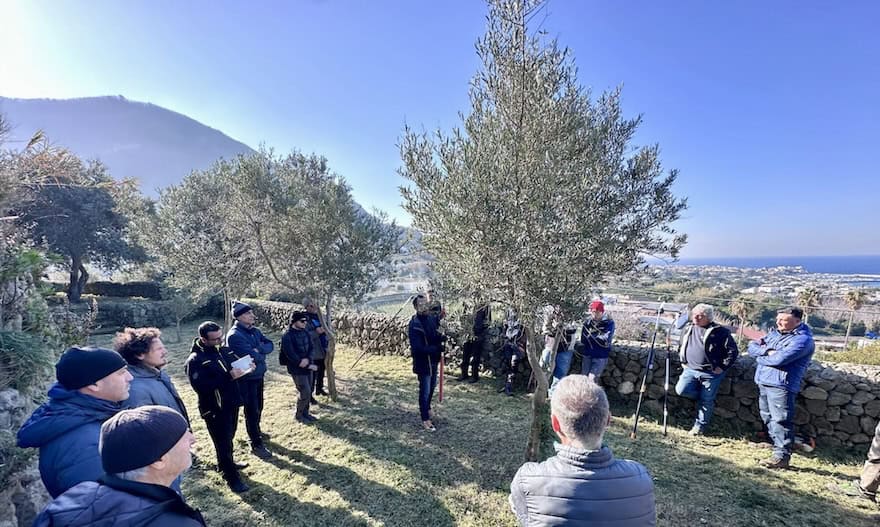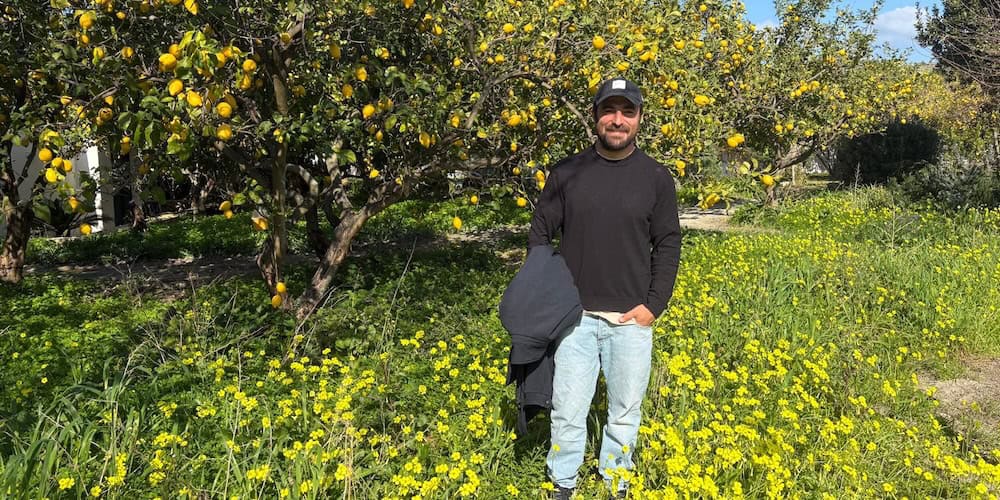On this volcanic island off Naples, we set out to understand how a certain agricultural heritage is being brought back to life. Between ancestral lemon trees, terraced olive groves and caves carved into the rock, a new generation of farmers is working to revive traditional know-how and embrace sustainability.
Meeting with Gaetano Villa Spadara and Giovannangelo De Angelis, two friends shaping the future of agriculture in Ischia.
Gaetano’s lemon trees, the island’s heritage
A farm in the heart of Ischia
Gaetano Villa Spadara is a young farmer passionate about the land. His family organic farm, among lemon trees, vineyards and olive trees, feels timeless. You can wander along the pretty paths drawn by his fruit trees, with either the sea or the mountain on the horizon.
We meet him to the west of the island, not far from Forio, in a volcanic area with rugged landscapes. His farm has been passed down for several generations and has been organic for more than twenty years.
The property covers about seven hectares, including two and a half hectares of lemon trees, an equal area of vines, and plots of tomatoes, lettuce, olives, fig trees and other citrus. All organized into stone terraces.
“One hundred years ago, the island was covered in vineyards; there wasn’t a single tree, no forest. The whole mountain was worked by hand, stone by stone.” he tells us, pointing to the mountain unfolding above us.
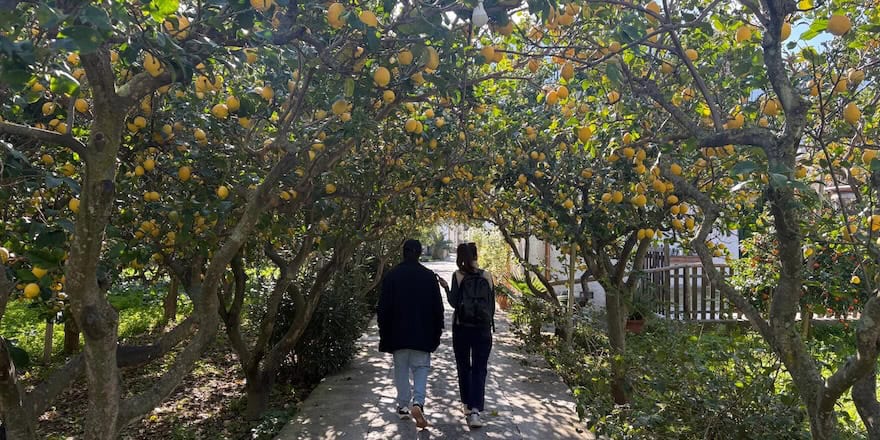
Human-scale, chemical-free agriculture
At Villa Spadara, agriculture is practiced in an artisanal and organic way, with a strong attachment to the soil and the natural cycle of the plants. Gaetano uses no pesticides on the lemon trees, and only a little natural sulfur for the vines.
The fertilizer (“concime” in Italian), he makes himself, from the prunings shredded on site.
This approach, started by his father more than two decades ago, is based on a vision of the land as a living organism. It’s not just about producing, but about coexisting intelligently with the plants, the climate cycles, and diseases.
“But beyond the labels, my grandfather was already organic without knowing it,” he clarifies.
The Zagara Bianca lemon, typical of Ischia
Gaetano mainly grows a local lemon variety: the Zagara Bianca, typical of Ischia.
A fruit with an intense aroma, very juicy, ideal for limoncello, ice cream, pastries — or simply to be eaten raw, with a little salt.
He harvests them twice a year, although one of the two bloomings produces smaller fruits. Thanks to its thick skin and richness in essential oils, this lemon can be kept for up to a month without refrigeration, sheltered from light and other fruits.
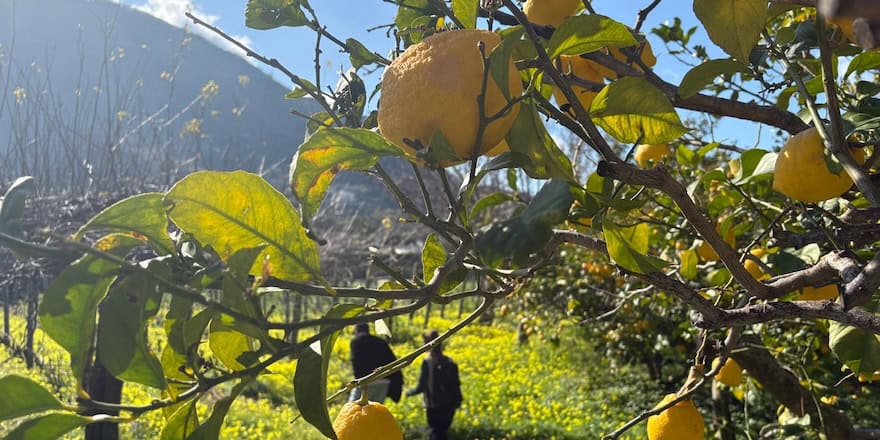
A terroir between volcano, forest and wetland
The farm is a true geological patchwork, cut through by layers of different rocks: black volcanic stone, the green rock typical of Ischia, sandy or clayey soil depending on the areas. In some plots, there are even hot water springs that naturally rise from the ground.
“By digging a little, you can find water at 60 or 70 degrees. I use it for tomatoes and salads. But we don’t irrigate lemons and grapes. They manage with the rain.”
This diversity of soils creates as many microclimates that influence the production and quality of the fruit. It is also what makes local agriculture so unique and so complex to manage.
Traditional skills, a heritage to preserve
Along a path, Gaetano gives us a tour of the old winemaking cellars: large vaulted rooms carved into the rock, equipped with vats for treading the grapes (the famous palmenti), lever presses (torchio) and ingenious drainage systems leading to the barrels.
These cellars, abandoned since World War II, testify to a past when Ischia produced wine in large quantities, exported as far as São Paulo, Buenos Aires and New York.
“Everyone in Ischia made wine. And good wine! We produced here as much as in Friuli, to the north. Today, I give my grapes to the Mazzella winery, which makes an organic wine: Enaria, a nod to the island’s ancient name.” he says.
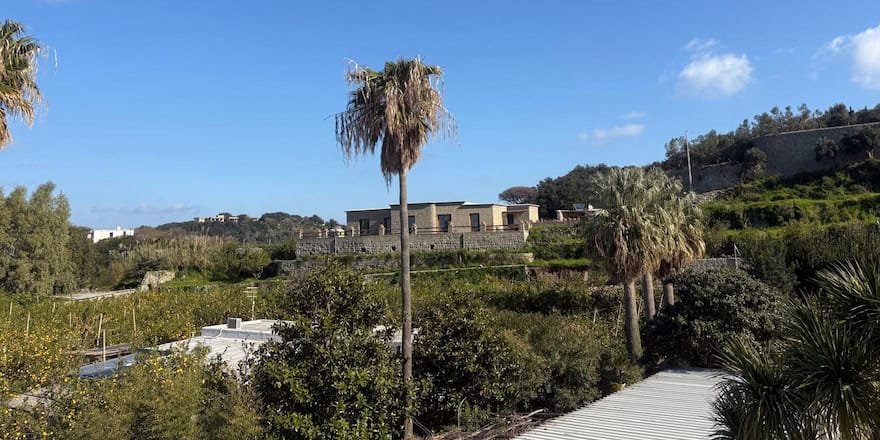
Resisting the upheavals of climate change
Despite the Garden of Eden feel with the azure sea as a backdrop, the situation is not idyllic. Like many organic farmers, Gaetano faces increasingly severe climatic and health-related challenges. Torrential rains in a single night, violent winds, new diseases, blooms cut short…
“Before, the climate was predictable. Today, everything changes from one day to the next. It’s sunny, then it rains, then sunny again… It’s very hard for the plants. We no longer have a rhythm.”
In this uncertain context, however, he continues to plant, to experiment, to diversify his crops — lemons, grapes, tomatoes, fig trees, pomegranates, bergamot, orange trees — with the same determination: to pass on a living, fertile land to his children.
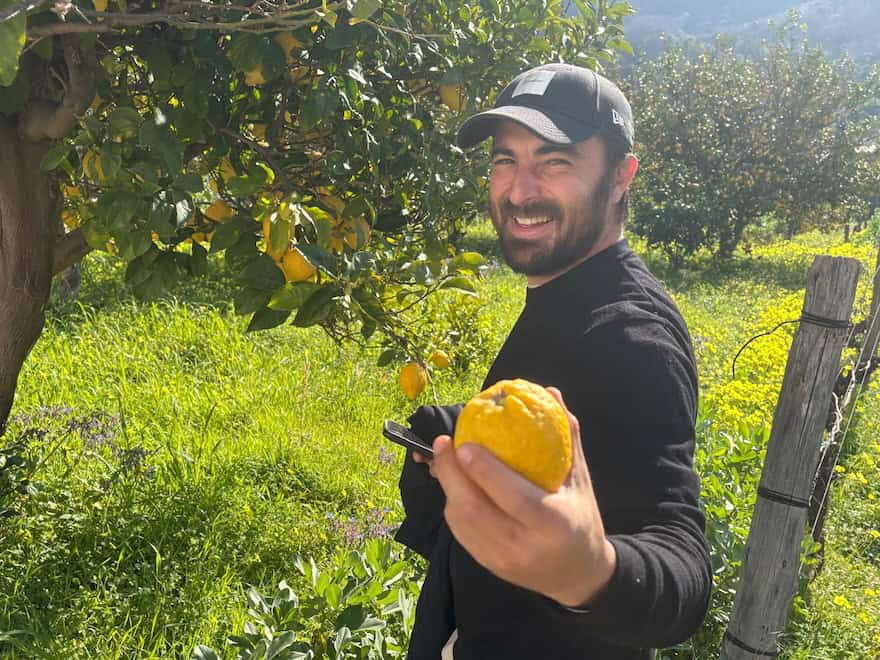
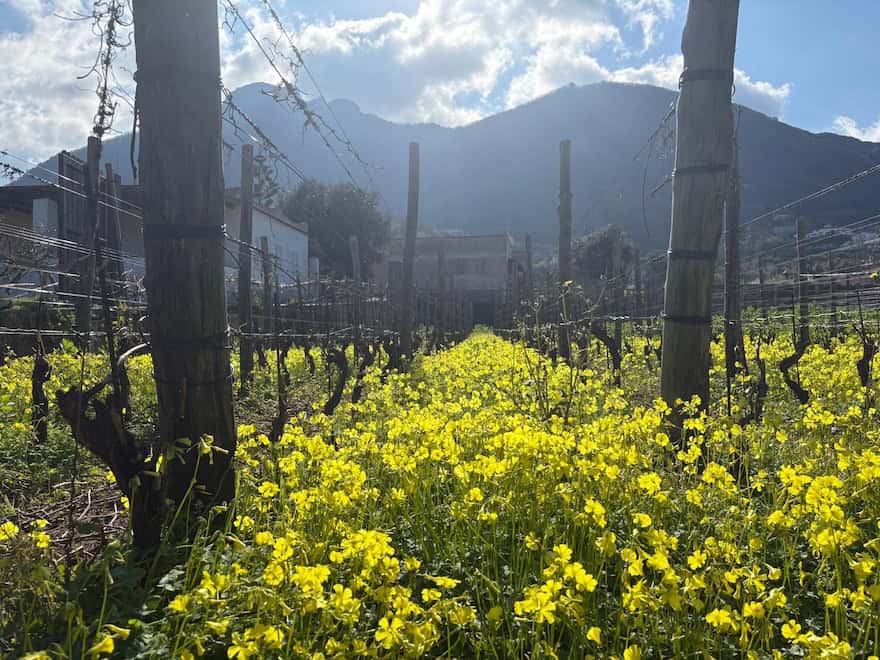
The revival of Ischia’s virgin olive oil
Rediscovering a forgotten treasure
We also met Giovannangelo De Angelis, president of a young local association, who is bringing the island’s endemic varieties and agricultural heritage back to life.
On the island of Ischia, known for its vineyards and its thermal baths, olive oil was long relegated to the background. Yet, olive trees have been growing there for more than 2,700 years, introduced by the Greeks. Giovannangelo De Angelis, an architect and agriculture enthusiast, decided to change things.
He is the founder of Oroverde – l’Olio d’Ischia, a local association that seeks to bring extra-virgin olive oil back to the heart of the island’s agricultural culture. With about twenty small producers, he rediscovers and promotes ancient olive trees, some of which have endemic varieties never recorded until now.
Produce less, but better
Members of Oroverde cultivate small plots: 40 olive trees here, 200 there. But their approach is demanding. They learn to identify defects, to cold-press, to recognize a true extra-virgin oil.
“A true extra-virgin, without defects, rich in polyphenols, is a medicine,” Giovannangelo insists.
Today, their production is still limited, often shared among friends. But local chefs are already interested, drawn by the idea of an authentic, traceable and local product.
One island, one oil, one vision
Beyond olive oil, Oroverde also wants to restore abandoned agricultural terraces, and promote practices such as permaculture and agroforestry. The idea? To give new purpose to a declining landscape and create a sustainable local economy linked to agritourism.
“We have everything: the olive trees, the landscapes, the know-how. We just have to believe in it and get back to it.” concluded Giovannangelo.
